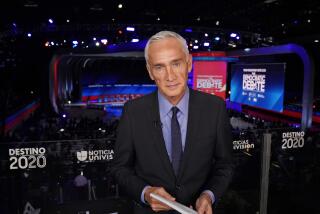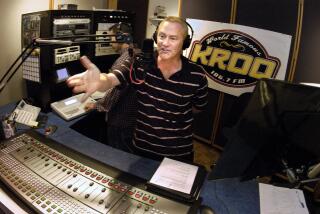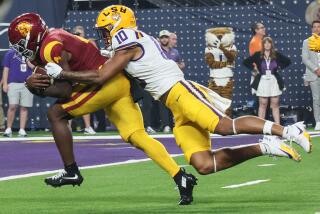Nielsen concludes L.A. radio ratings probe; Univision not sanctioned

Nielsen said it has concluded an investigation into tampering of Los Angeles radio ratings, but stopped short of sanctioning Univision Communications for unethical conduct by a former station executive.
Dramatic swings in ratings this year were primarily isolated to Univision’s KSCA-FM (101.9) Spanish-language radio station, Nielsen said after its review of the tainted data. The measurement firm said the breaches did not substantially affect audience levels reported for other stations in the nation’s largest radio market.
The probe into possible ratings manipulation was launched after KSCA morning show “El Bueno, La Mala y El Feo” leapfrogged to the No. 1 slot over big names such as KIIS-FM (102.7) morning host Ryan Seacrest. The big jump rattled radio circles because strong ratings help stations fetch more money from the nearly $1 billion spent in L.A. each year on radio commercials and promotions.
Nielsen found that a high-ranking Univision executive at KSCA had access to several of the devices used to collect listening data. That violated Nielsen’s rules, and Univision fired its program director for the alleged misconduct; no other station employees were reprimanded.
L.A. radio stations were notified Wednesday that Nielsen would not reissue ratings for 2013 or this year’s first quarter. Nielsen said there “were minimal differences in the estimates for the overwhelming majority of other stations in the market” and did not discipline Univision.
Some L.A. radio station executives questioned why Nielsen did not take more aggressive action against the media giant.
“Not even a slap on the wrist?” asked one station executive, who did not want to be identified criticizing a competitor. “This is a matter of principle, accountability and integrity.”
Nielsen’s handling of Univision was in contrast to a situation last fall in Northern California. Nielsen took the unusual step of “delisting” three Fresno radio stations owned by JSA Broadcasting after Nielsen uncovered similar evidence of tampering.
In that case, Nielsen determined that someone affiliated with JSA had filled out and submitted paper diaries used to determine listening levels in smaller markets. Nielsen removed the three stations from its ratings surveys for last fall.
However, radio executives and analysts said they were not surprised that Nielsen would not reissue a year’s worth of ratings.
Such a move could have further fueled the controversy and invited more questions about the reliability of Nielsen’s ratings. Analysts also noted that Univision is one of Nielsen’s biggest clients and pays millions of dollars a year to get rankings for its chain of radio stations and Spanish-language television networks.
Michael Harrison, publisher of the radio trade publication Talkers, said station operators are frustrated with the problems with the Nielsen ratings, which they use to determine the rates they charge advertisers.
“The small station operators who are in the community are pulling their hair out,” Harrison said. “No one in our industry is very comfortable with the present state of things. And Nielsen is not comfortable either.”
Univision declined to comment. Nielsen declined Wednesday to discuss why it handled the Fresno situation differently from the one in L.A.
In its memo sent to station managers and reviewed by The Times, Nielsen said it “found that 98.8% of the records had less than a 5% difference between the originally published” data and the information after the corrupt data were taken out of the sample.
“Nielsen is committed to upholding the highest standards of data integrity,” Nielsen said in a statement. “We have taken a number of actions to minimize the risk of reoccurrence and to strengthen our measures to ensure that panelists are complying properly in all markets.”
The problems appeared to be concentrated in homes in which Spanish is the dominant language. Historically, ratings firms including Nielsen have struggled to recruit immigrant families to participate in the surveys because members of those households were wary of an organization that wants to provide them with tracking devices.
To make up for any shortfall in Spanish-speaking families, Nielsen has used statistical calculations to “weight” its sample. But that method could lead to any one family having a disproportionate influence on the outcome of the ratings.
“Something is wrong with the radio ratings,” Harrison said. “The ratings sample size is generally recognized as too small to be consistent month to month and too imprecise to get an accurate picture, especially of a diverse metropolitan area like Southern California. It’s not an exact science at a time when advertisers are demanding metrics that are more precise.”
Nielsen has said it plans to expand its sample audience pool in Los Angeles by year’s end. Currently, there are 2,700 homes in the Los Angeles market participating in the company’s audio measurement. It was not known how many are Spanish speaking.
Tom Taylor, a longtime journalist who writes a daily newsletter about the radio industry, said Nielsen’s customers would be pleased to see the sample size increase to minimize surprise bumps. But, he said, that effort would require a significant investment.
“That’s more work for Nielsen, and more expense, of course,” he said.
Nielsen took the extraordinary step of reissuing its April ratings report after it the company found out two homes in L.A. might have manipulated the rankings. The company also delayed the release of its May results to recalibrate the rankings after removing listenership data from two households, including one that had connections to the Univision executive.
The households had been part of the Nielsen sample audience for at least a year, which raised questions about how long Univision and another station that received a boost in the ratings might have benefited from the alleged misconduct. The second station was Radio Centro’s Spanish-language KXOS-FM (93.9).
Nielsen’s memo did not mention Radio Centro’s station, which also saw major changes in its ratings. Its morning audience share fell 37% in May from April’s compromised numbers.
Meanwhile, Univision’s KSCA posted another surge in the morning ratings in June.
KSCA’s show “El Bueno, La Mala y El Feo” appears to be gaining traction among listeners. It returned to the top spot in the morning drive period, according to June numbers from Nielsen. For the weekday 6 a.m. to 10 a.m. time slot, KSCA earned a 5.1 share of radio listening in the period that ended June 18.
That share is 24% greater than the number the station earned during the previous month for the time slot that is considered prime time for radio.
This follows KSCA’s previous surprise jump to No. 1 in April. KXOS’ morning ratings stayed essentially flat in June compared with May by notching a 2.8 share and holding steady at 14th place, down from an inflated fourth place in April.
More to Read
From the Oscars to the Emmys.
Get the Envelope newsletter for exclusive awards season coverage, behind-the-scenes stories from the Envelope podcast and columnist Glenn Whipp’s must-read analysis.
You may occasionally receive promotional content from the Los Angeles Times.








